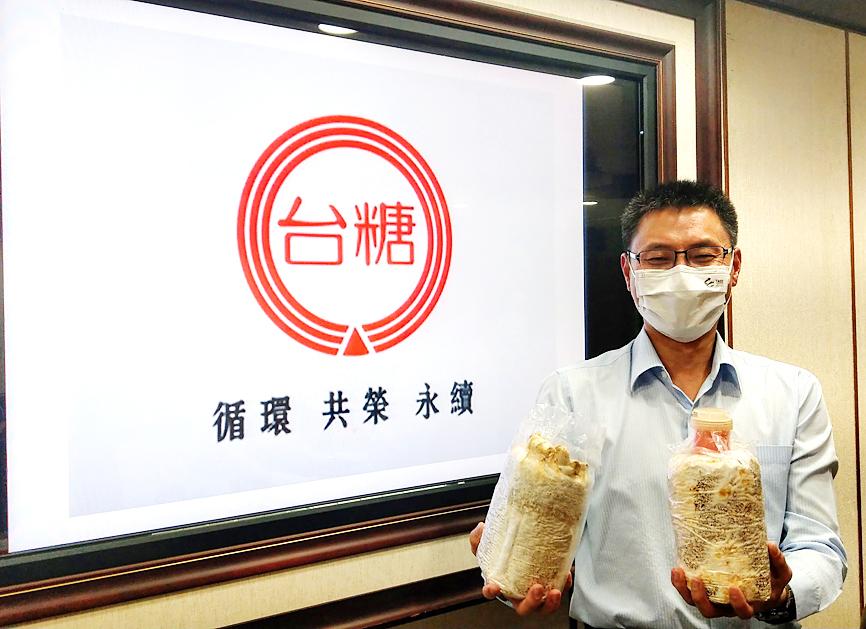Taiwan Sugar Corp (Taisugar, 台糖) shareholders yesterday approved the distribution of a cash dividend of NT$1.1 per share, after the state-run company last year posted a net profit of NT$4.57 billion (US$164.1 million), surpassing its statutory net profit by NT$1.73 billion.
At the company’s annual general meeting in Tainan, Taisugar announced that it made an operating profit of NT$1.37 billion last year, NT$1.03 billion more than required.
“The company followed market trends and adapted to industry changes, and continuously adjusted its business development strategies, which allowed it to meet the goals set by the government,” Taisugar said in a statement.

Photo courtesy of Taiwan Sugar Cop via CNA
Taisugar has over the past few years diversified its business, making inroads into hog farming, renewable energy, biotechnology and other sectors.
Last year, the company revamped its agriculture business, including modernizing its hog farming facilities, and investing in renewable energy research and development, it said.
Taisugar also adopted strategies of circular economy, using sugarcane by-products to cultivate mushrooms and by-products of mushroom farming as fertilizer, it said.
About 400 tonnes of sugarcane by-products are recycled every month for use in mushroom farming, it added.
As a part of its social responsibility mandate, Taisugar last year started producing alcohol-based sanitizers and other COVID-19 prevention items, the firm said.
It also reduced rents at its properties and accepted delayed rent payments amid the COVID-19 pandemic, Taisugar said.
For this year, the firm aims to better utilize its assets and improve its performance, as well as transition into a “green and healthy enterprise” that “promotes new agriculture and a circular economy in Taiwan,” Taisugar said.

Among the rows of vibrators, rubber torsos and leather harnesses at a Chinese sex toys exhibition in Shanghai this weekend, the beginnings of an artificial intelligence (AI)-driven shift in the industry quietly pulsed. China manufactures about 70 percent of the world’s sex toys, most of it the “hardware” on display at the fair — whether that be technicolor tentacled dildos or hyper-realistic personalized silicone dolls. Yet smart toys have been rising in popularity for some time. Many major European and US brands already offer tech-enhanced products that can enable long-distance love, monitor well-being and even bring people one step closer to

Malaysia’s leader yesterday announced plans to build a massive semiconductor design park, aiming to boost the Southeast Asian nation’s role in the global chip industry. A prominent player in the semiconductor industry for decades, Malaysia accounts for an estimated 13 percent of global back-end manufacturing, according to German tech giant Bosch. Now it wants to go beyond production and emerge as a chip design powerhouse too, Malaysian Prime Minister Anwar Ibrahim said. “I am pleased to announce the largest IC (integrated circuit) Design Park in Southeast Asia, that will house world-class anchor tenants and collaborate with global companies such as Arm [Holdings PLC],”

Sales in the retail, and food and beverage sectors last month continued to rise, increasing 0.7 percent and 13.6 percent respectively from a year earlier, setting record highs for the month of March, the Ministry of Economic Affairs said yesterday. Sales in the wholesale sector also grew last month by 4.6 annually, mainly due to the business opportunities for emerging applications related to artificial intelligence (AI) and high-performance computing technologies, the ministry said in a report. The ministry forecast that retail, and food and beverage sales this month would retain their growth momentum as the former would benefit from Tomb Sweeping Day

Thousands of parents in Singapore are furious after a Cordlife Group Ltd (康盛人生集團), a major operator of cord blood banks in Asia, irreparably damaged their children’s samples through improper handling, with some now pursuing legal action. The ongoing case, one of the worst to hit the largely untested industry, has renewed concerns over companies marketing themselves to anxious parents with mostly unproven assurances. This has implications across the region, given Cordlife’s operations in Hong Kong, Macau, Indonesia, the Philippines and India. The parents paid for years to have their infants’ cord blood stored, with the understanding that the stem cells they contained